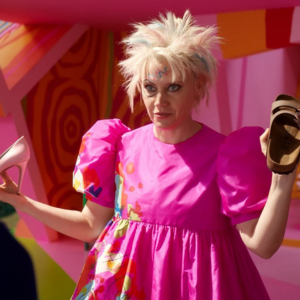Last month during our Anniversarymoon, my husband and I saw the movie Barbie. I enjoyed it. I thought the writers and everyone who brought it to life did a wonderful job at touching on some very hot button issues while touching on issues and ideas regarding of one of history’s most beloved and cherished dolls.
The movie itself for me was surprisingly refreshing in that it brought back fond memories of my own Barbies. In fact, I have a Holiday Edition collection of Barbies in mint condition thanks to a woman that loved me named Mary Scarborough. She had 5 girls of her own but still saved money every year to give me one as a Christmas gift. So I felt a lot of love and nostalgia. On the other hand, I was a little grieved. What was most appalling and saddening for me was how Weird Barbie was treated. That’s because I feel like she really represented certain women and girls. There she was outside of Barbieland in horrible condition and without the community of the other Barbies. No one bothered to ask her if she was okay, or figure out a way to heal or repair her in Barbieland. No one had compassion for her condition even though they knew it was caused by abuse. In fact, the abuse was downplayed and described as the result of her owner “playing too hard” with her. No one seemed to really understand the fact that they could have been Weird Barbie themselves. Instead, they simply labeled her weird and treated her so called weirdness as though it was contagious and embarrassing, and then outcast her from Barbieland society. In fact, they started to treat Stereotypical Barbie as though she was Weird Barbie #2 when she showed them what was happening to her. Then, one of the Barbies tells Stereotypical Barbie to go see Weird Barbie because Weird Barbie was the only one who could possibly help her; after they all gossiped about her and made snarky remarks about her.
It took some weeks after I’d seen the movie to fully understand how I felt when I saw it. And even now, this is a movie I’ll have to watch a few more times to unpack everything I saw (and there was a lot). But the main thing I felt was a lot of compassion for Weird Barbie. I don’t think she was weird at all. I think she was an abuse survivor who looked like what she’d suffered. And because I’ve been a girl and then a woman all my life I know from observation and experience that looking (and acting) like what you’ve suffered (no matter the cause or severity level) does not bode well for you. It often invites ridicule, bullying, gossip, further abuse, and exile from the “sisterhood” of Womanhood. Weird Barbie’s presence highlights a point that I’m sure is unpopular to those who have never been her; which is that you don’t have sisterhood if the different ones are invisible (until you want something from them), exiled and excluded. You have a club. Maybe a sorority. But you don’t have a sisterhood.
I’m sure there was discourse on how Barbie did a phenomenal job tackling toxic masculinity, feminine empowerment and maybe even feminism. I have unpopular opinions on those too, but it’s not my goal to share that now. I just know that you can tell a lot about any group by how they treat the one or ones that are different than everyone else. Now, when I say different I don’t mean toxic or unsafe. I mean different. Not conforming at all or completely to societal or group standards. And consequently being excluded or scapegoated, thus proving that the dynamics within the group itself is actually toxic or dysfunctional. Perhaps this is the reason for the exile. It’s easier to avoid your discomfort about yourself and those around you by labeling someone as weird and placing them outside of your group or society. It’s cold, cruel and very mean. But a lot of us would rather burn the different one than face the truth about ourselves or our “sisters”. It’s easier to trade the sister for the so-called sisterhood.
A woman called me weird once because I shared my artwork and why I created it. I called her out on it. She tried to backtrack saying that she didn’t mean it like that, but she did. It didn’t phase me or stress me internally because I know who I am and I know I’m not weird. In the same breath, I won’t accept someone calling me weird just because they disagree with me or think who I am is unacceptable. I still share my artwork and I still share these talks because I know that who they’re meant for will appreciate them and be blessed by them. Whoever they’re not meant for really should just keep scrolling and keep their labels. I respect differences of thought and onion. I do not tolerate mean-girl labeling and bullying.
Weird Barbie isn’t weird. She’s a survivor. And she deserved more respect than she got from the other Barbies. After all, it was her who sent Steroptypical Barbie on the mission to save herself and ultimately all of Barbieland (even though Steroptypical Barbie almost botched it). So, if you identify with Weird Barbie (even if you don’t want to admit it), take heart. You’re not weird. You survived. You have insight, wisdom and treasures of experiences that came from being different. Believe it or not, you are not alone. And never let anyone else tell you otherwise. For more musings about life, check out the rest of my blog! And to stay in touch, join our e-mail blogletter below.




